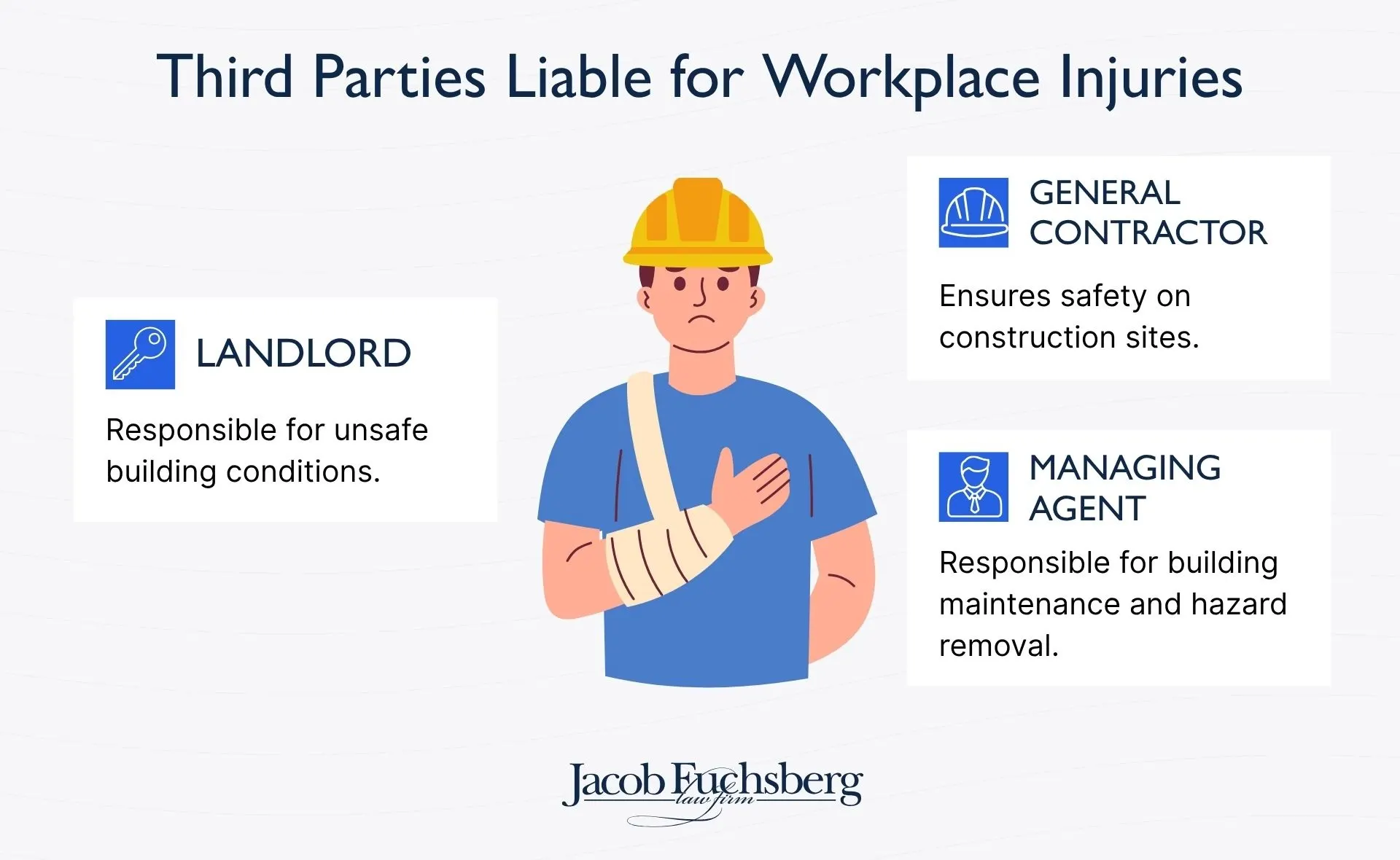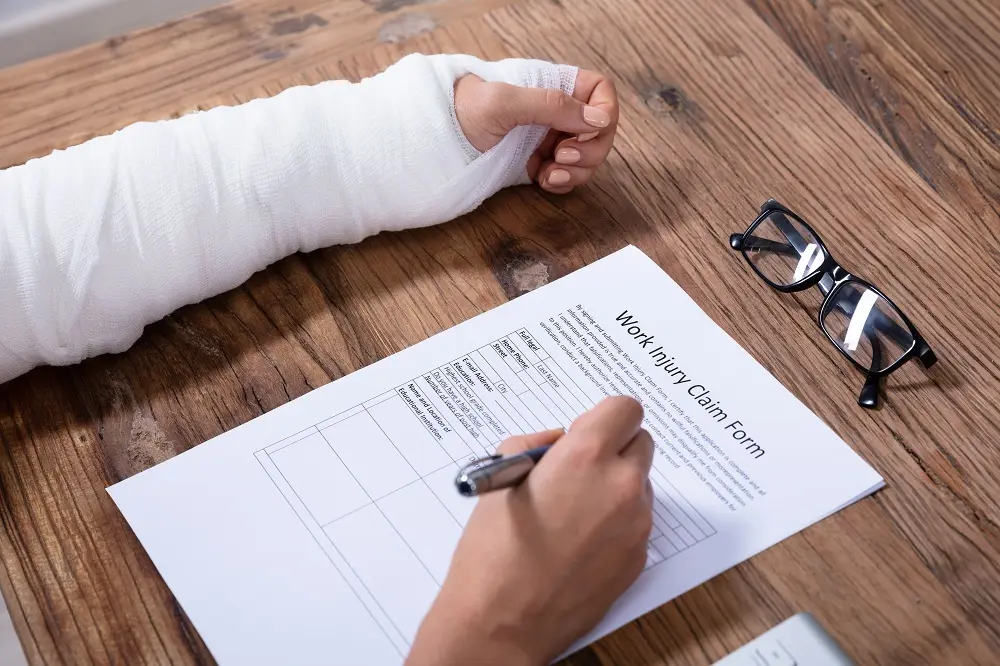When you’re seriously hurt at work, it can throw a huge wrench into your life and the daily life of your family. Beyond the immediate medical concerns, there's a risk that could cost you thousands in lost wages, unpaid bills, and difficulty putting food on the table. Even though workers’ comp benefits should kick in, sometimes they aren’t enough. But there are other options, especially if your injury was caused by the negligent actions of someone other than your employer.
Unlike workers' compensation, a third-party negligence claim can unlock significantly higher payouts. Workers’ comp doesn’t pay for your pain and suffering, but a third-party personal injury lawsuit can. But there are strict time limits as to when these lawsuits must be filed. Miss the deadline by even one day, and you could lose your right to receive thousands of dollars above and beyond what you got paid from work comp. Our New York workplace accident lawyers specialize in protecting these claims before time runs out.
Workplace Injuries Often Caused by Third-Party Liability Claims

Understanding which types of workplace injuries commonly involve third-party liability is important for recognizing when different statute of limitations periods apply:
- Slip and fall accidents: Often involving landlord liability when unsafe building conditions, poor maintenance, or code violations contribute to the accident.
- Construction site accidents: Frequently triggering claims against general contractors who fail to maintain safe working conditions under New York Labor Law.
- Equipment and machinery failures: May involve managing agent liability when building systems or contractor-provided equipment causes injuries.
- Structural collapses or failures: Often implicating multiple third parties, including property owners, contractors, and management companies.
- Chemical exposure or burns: Can involve landlord or managing agent liability for hazardous building conditions or inadequate safety systems.
- Falling object injuries: Commonly involve general contractor liability on construction sites or managing agent responsibility for building maintenance failures.
Understanding Statute of Limitations for Third-Party Workplace Claims
The statute of limitations on workplace injury claims against third parties refers to the legal timeframe in which you can take action against landlords, general contractors, managing agents, and other non-employer parties. In New York, these periods are distinct from workers' compensation deadlines and vary depending on the type of entity you're suing:
Personal Injury Claims Against Private Third Parties
Three-year statute of limitations (CPLR §214(5)) applies to most third-party workplace injury claims against:
- Landlords and property owners
- General contractors and subcontractors
- Managing agents and property management companies
- Equipment manufacturers and suppliers
- Other private parties whose negligence contributed to your workplace accident
Claims Against Government Entities

Claims against government entities have strict deadlines:
- Federal claims require an SF-95 within two years
- New York State claims need a notice of intention within 90 days and a lawsuit within two years
- City or county claims need a notice of claim within 90 days, a 50H hearing, and a lawsuit within one year and 90 days
Because deadlines vary by level of government, it’s best to contact our experienced attorney to ensure all notices and filings are completed correctly and on time to preserve your right to compensation.
Special Construction Accident Deadlines
New York Labor Law claims may have specific timing requirements when pursuing third-party liability against general contractors and property owners with statutory duties for construction site safety under Labor Law §§200, 240, 241-6. Typically, you must file a claim within three years of the accident, but stricter deadlines may apply depending on the nature of the violation, potentially requiring earlier notice.
Missing these deadlines almost always means forfeiting your right to recover damages like pain and suffering and loss of consortium from third parties, no matter how strong your case may be against these liable parties. Consulting our knowledgeable New York workplace injury attorney early can help ensure that every step is taken on time and your claim is protected from procedural pitfalls.
Third-Party Liability: Understanding Responsible Parties
When your workplace accident involves third parties, each type of entity has specific responsibilities that can make them liable:

Landlord Liability for Workplace Accidents
Landlords can be held liable when unsafe building conditions in leased commercial spaces contribute to workplace accidents, including failures to maintain safe building conditions, building code violations, or negligent maintenance of common areas.
General Contractor Liability on Construction Sites
General contractors bear significant responsibility for maintaining safe working conditions for all workers on their sites, including failure to provide adequate safety supervision, defective equipment provision, or poor coordination, creating dangerous conditions.
Managing Agent Liability for Building-Related Injuries
Property management companies can face liability when their negligence contributes to workplace accidents, such as failing to address known hazards, negligent building system maintenance, or violation of property management safety duties.
How Statute of Limitations Works in Multi-Party Workplace Cases
When multiple third parties share liability for your workplace accident, the legal timeline becomes more complex:
- Coordinating multiple deadlines: While most private third parties share the same three-year deadline, federal government, state, county, and city entities have much shorter timeframes, requiring careful case management to ensure all claims are filed timely.
- Joint investigation timing: Evidence preservation and witness interviews must occur quickly to support claims against all potentially liable parties within their respective limitation periods.
- Insurance notice requirements: Different third-party insurance carriers may have varying notice requirements that affect your ability to recover, regardless of statutory deadlines.
- Discovery coordination: The available investigation period must be used efficiently to build cases against all liable third parties simultaneously.
Exceptions That May Extend or Shorten Third-Party Deadlines
Several situations can modify how the statute of limitations applies to third-party workplace injury claims:
- Discovery rule exceptions: Some occupational illnesses or toxic exposure cases may allow deadlines to start when the injury is discovered and linked to third-party negligence, rather than the exposure date.
- Continuing violation doctrine: When third parties engage in ongoing negligent conduct, the limitation period may be extended for certain types of claims.
- Fraudulent concealment: If third parties actively conceal their negligence or liability, deadlines may be tolled until the concealment is discovered.
- Minor worker protections: Injured workers under 18 may have extended deadlines against third parties until they reach majority age.
- Contractual notice requirements: Some third-party contracts may contain even shorter notice requirements than statutory deadlines, potentially shortening your available time to file claims.
Why Acting Quickly on Third-Party Claims Matters

Delays in pursuing third-party workplace injury claims create significant risks that apply regardless of which type of third party is involved:
Evidence Deterioration
Construction sites change rapidly, building conditions are repaired, and surveillance footage is deleted or reused.
Witness Unavailability
Contractors, supervisors, and other workers may change jobs, relocate, or forget important details about accident conditions.
Insurance Complications
Third-party insurance carriers may deny coverage or claim policy exclusions if they don't receive prompt notice of potential claims.
Document Preservation
Vital safety records, inspection reports, and maintenance logs may be destroyed in routine business operations.
Multiple Defendant Coordination
When several third parties are involved, delays can complicate the process of determining each party's level of responsibility.
FAQ
FAQ on Workers' Compensation and Workplace Injury Claims
How do third-party liability deadlines differ from workers' compensation time limits?

Workers' compensation requires employer notification within 30 days and board filing within two years, while third-party claims against landlords, contractors, and managing agents typically have three-year deadlines with different notice requirements.
Can I pursue both workers' compensation and third-party liability claims?

Yes, you can and should pursue both when third parties contributed to your workplace accident. Workers' compensation provides immediate benefits, while third-party claims can provide full compensation, including pain and suffering. Our law firm specializes exclusively in third-party claims, helping you maximize recovery from landlords, contractors, and managing agents.
What if the workplace accident resulted in death?

Families typically have two years from the date of death to file wrongful death claims against third parties, in addition to workers' compensation death benefits.
Maximize Your Compensation with Third-Party Liability Claims. Let Us Help.
Injured due to a landlord, contractor, or managing agent’s negligence? Act within the legal deadlines to maximize your compensation.
Protect Your Rights Before Time Runs Out
If you've been injured at work in New York, understanding the statute of limitations for third-party claims against landlords, general contractors, managing agents, and others is crucial to recovering full compensation. These deadlines are unforgiving, but the potential recovery from third-party liability claims often far exceeds workers' compensation benefits alone.
Our exceptional workplace accident attorneys know how to quickly identify all potentially liable third parties and ensure all claims are filed within the applicable statute of limitations. Contact us today for a free consultation and let us protect your rights before time runs out.

.svg)











